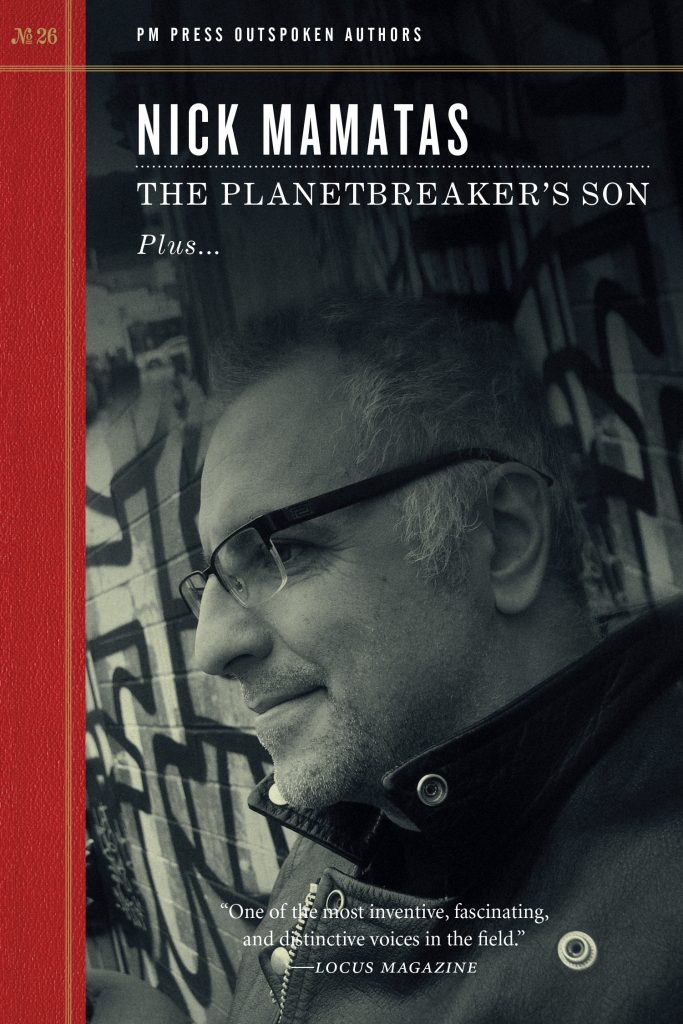By Marion Deeds
Fantasy Literature
February 18th, 2021
5 stars
PM Press’s Outspoken Authors imprint published The Planetbreaker’s Son (2021) by Nick Mamatas. The slim book includes the titular novella, the SF story “Ring, Ring, Ring, Ring, Ring, Ring, Ring,” a personal essay called “The Term Paper Artist,” and an interview with Mamatas hosted by Terry Bisson.
Honestly, the quirky interview with these two guys was worth the price of the book for me.
In a brief statement at the beginning of “Ring, Ring, Ring, Ring, Ring, Ring, Ring,” Mamatas thanks Jeffrey Thomas for an invitation to write in Thomas’s shared-world “Punktown” setting. (The story was originally published in 2018, in the anthology Transmissions from Punktown.) Punktown is a science-fictional megalopolis, filled with various species and various kinds of tech. In “Ring x7” (to keep spellcheck happy) a human woman buys an old-fashioned toy — a Ouija phone. Frankly, Mamatas had me at “Ouija phone.” The living owner can pick up the archaic headset of the phone and listen to the various voices of the dead. The thing isn’t supposed to be taken seriously, it doesn’t even have a ringer, but Janice, the owner, has become slightly addicted to it, and one night she hears a voice she knows. This voice shares vital information that sends Janice out on a multi-species killing-spree, stopped only by two intrepid partners from the phone company, Augustus and Jeff.
Mamatas has created a partnership that is perhaps the wildest odd-couple pairing I’ve read in any genre. Augustus is a being who can translocate himself and others, and Jeff is almost literally a flea in his ear. (Jeff, a Mee’hi, may be slightly smaller than a flea.) They translate Janice back to her house and discover that her Ouija phone is malfunctioning. It’s touch-and-go for a few minutes, and Janice’s understanding of afterlives of many species seems suspiciously detailed, but ultimately Jeff and Augustus take care of the problem. Or it seems so, until the Ouija phone begins to ring.
This is a brutal, irreverent, satirical, funny science fiction horror story, and the narrative voice of Jeff elevates it to a disconcerting and delightful reading experience.
Outspoken Authors series
“The Term Paper Artist” details Mamatas’s experience as someone who worked for a term paper mill. It is, as the book says, “A true story based on lies.” Mamatas crisply delineates the kinds of student who need to buy term papers — there is more than one — but stresses that genuinely stupid, or at least ignorant, students are by far the largest demographic. “Be sure to underline the thesis statement so the student can say what it is if asked” is a recurring theme. It’s clear to Mamatas that many of his clients have not only never written a term paper, they’ve never been required to read one, either, and they have no idea of the structure. The essay is hilarious, heartbreaking and infuriating if you take education seriously, which is exactly as Mamatas intends.
“The Planetbreaker’s Son,” a novella, takes up the bulk of the book. It’s hard to describe this story. I could say it’s about a generation ship after Earth’s been destroyed, and that would be true. I could call in a multi-generational family drama, and that would be true too. I think it’s an experiment in post-human evolution and a study of fathers and sons, a recurring theme for this writer. Instead of going for the threadbare disclaimer, “This story is not for everyone,” I’m going to offer a litmus test. If I say, “In this story, Kronos and Rhea live in the heart of a black hole,” are you intrigued? If your answer is yes, that you will be drawn right in (I resisted the temptation to write “sucked right in,” and it was a struggle).
I re-read “The Planetbreaker’s Son” almost immediately, because on the first read-through I wasn’t quite sure what was going on until very near the end. The second read gave me time to admire Mamata’s prose, always one of the high points of his work.
I like PM Press’s structure for these books, which might be considered samplers of a writer’s work. The fiction was outstanding, but probably (sadly) the piece that will stay with me is the personal essay. If you’ve enjoyed Mamatas’s other work, The Planetbreaker’s Son is a book for you. Published in February 2021. He walks the stars embedded in the virtual dome of night and, when he tires of a world, throws a small black stone over his shoulder—and entire societies blink out of existence. The work is necessary, or so he insists. But the Planetbreaker’s son has his own ideas. Meanwhile, in “The Strange Case Of,” Mamatas gleefully blinks sentimental, shopworn ideas out of easy acceptance. “The Twin Dragons of Sentimentality and Didacticism” explores the dangers and pleasures of Animal Rescue. But listen. That “Ring, Ring, Ring” (and so forth) you hear is the dreaded ouija phone connecting the living with the dead. And it’s for you. Of course we include our predictably unpredictable, outrageously rageous Outspoken Interview with Mamatas. Also for you.
SHARE: FOLLOW:
If you plan to buy this book, you can support FanLit by clicking on the book cover above and buying it (and anything else) at Amazon. It costs you nothing extra, but Amazon pays us a small referral fee. Click any book cover or this link. We use this income to keep the site running. It pays for website hosting, postage for giveaways, and bookmarks and t-shirts. Thank you!
February 18th, 2021. Marion Deeds´s rating: 5 | Nick Mamatas | Short Fiction | SFF Reviews, We Love This! | no comments |

Marion Deeds, with us since March, 2011, is the author of the fantasy novella ALUMINUM LEAVES. Her short fiction has appeared in the anthologies BEYOND THE STARS, THE WAND THAT ROCKS THE CRADLE, STRANGE CALIFORNIA, and in Podcastle, The Noyo River Review, Daily Science Fiction and Flash Fiction Online. She’s retired from 35 years in county government, and spends some of her free time volunteering at a second-hand bookstore in her home town. You can read her blog at deedsandwords.com, and follow her on Twitter: @mariond_d.

Nick Mamatas is the author of three novels, including the Lovecraftian Beat road novel Move Under Ground, and Under My Roof, a novel of neighborhood nuclear supremacy. With Brian Keene he wrote The Damned Highway and with Ellen Datlow edited the anthology Haunted Legends. His how-to pamphlet on writing, Starve Better, was released in March 2010.
Nick has also published over seventy short stories and hundreds of articles. His short fiction has appeared in Asimov’s Science Fiction, Mississippi Review Online, subTERRAIN, Hint Fiction, Supernatural Noir and other venues, and a number of his stories were collected in the book You Might Sleep . . . His reportage and essays have appeared in the Village Voice, The Smart Set, Clamor, In These Times, the books You Are Being Lied To and Everything You Know is Wrong, H+, Poets & Writers, The Writer and many many other places.






